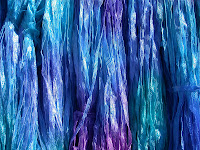 |
| Acid dyes on nylon ribbon |
Cellulose fibers are plant fibers. Pretty much anything that comes from a plant is cellulose fibers. These fibers are broken down and damaged by acid, so you treat them with an alkali to set the dye. Cellulose fibers love dye and will take up the dye at room temp [over 68 degrees F] without being heated.
Protein fibers are fibers that come off an animal - hair, fur, etc. These fibers are broken down and damaged by alkalis and need to have acid to set the dye. Protein fibers have to be heated to set dye.
Synthetic fibers are man-made, often petroleum based fibers.
Each type of fiber reacts to and takes up dye differently, so different dyes are specifically formulated to work with each type of fiber: fiber reactive dyes for cellulose, acid dyes for protein and vat dyes [or direct dyes or some other ones....] for synthetic fibers.
Now, you'd think that it would be easy to classify fibers, and therefore, choose a dye and mostly it is easy, but there are some glaring exceptions. I'll take each dye type and break it down.
Fiber reactive [MX] dyes are the best and easiest dyes to use on cellulose fibers: cotton, linen, hemp. This includes 'synthetic' fibers that are extruded from plant fibers, e.g. rayon and tencel. Exceptions: Soy silk, even though it comes from a plant, does not dye well with MX dyes - too much protein. Ingeo, from corn, is so synthesized that it takes a vat dye to dye it.
Acid dyes are the best and easiest dyes to use on protein fibers: silk, wool, alpaca, angora, mohair, dog, llama, buffalo, camel, etc. Exceptions: Superwash wool does NOT like acid dyes. Use fiber reactive dyes for superwash. Another exception is that we DO use acid dyes to dye soy silk and nylon.
Vat and Direct dyes are used for synthetic fibers such as acrylic. These dyes are nasty. I never use them because the fumes are dangerous and I'd rather dye anything but acrylic.
Exceptional fibers: Silk is a wonderful fiber. It loves dye. Really loves dye. Mostly I dye it with fiber reactive dyes but you can use acid dyes if you like. No matter what dye you use, silk, because it is protein, has to be heated to set the dye. Nylon is a synthetic fiber, but generally likes acid dyes, so that's what I use. Soy silk likes acid dyes. Superwash wool likes fiber reactive dyes.
Tomorrow, I'll talk about dyeing with Acid dyes.
